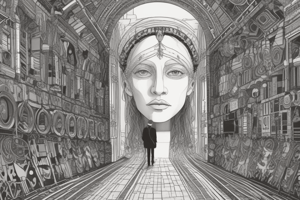Podcast
Questions and Answers
What are the three fundamental parts of social change?
What are the three fundamental parts of social change?
- The amount of change, the direction of change, and the nature of change (correct)
- The cause of change, the effect of change, and the outcome of change
- The amount of change, the reaction to change, and the types of change
- The speed of change, the impact of change, and the method of change
Which of the following is a characteristic of the evolutionary theory of social change?
Which of the following is a characteristic of the evolutionary theory of social change?
- It emphasizes that conflict is necessary for progress
- It focuses on the cyclical nature of societal development
- It suggests that societies decay after reaching maturity
- It likens social change to biological evolution and suggests progress (correct)
According to the conflict theory, social change occurs primarily due to:
According to the conflict theory, social change occurs primarily due to:
- Oppressed groups striving for improvement of their conditions (correct)
- The natural evolution of societal norms and practices
- The gradual decay of political institutions
- The peaceful transfer of power among social classes
The cyclical theory of social change suggests that societies:
The cyclical theory of social change suggests that societies:
Herbert Spencer's viewpoint on social institutions was that:
Herbert Spencer's viewpoint on social institutions was that:
Equilibrium theory is based on which of the following concepts?
Equilibrium theory is based on which of the following concepts?
What does the amount of change in social transformation refer to?
What does the amount of change in social transformation refer to?
Which statement aligns with Oswald Spengler's beliefs regarding social change?
Which statement aligns with Oswald Spengler's beliefs regarding social change?
What is a primary attribute of social change regarding its timing?
What is a primary attribute of social change regarding its timing?
Which aspect of social change illustrates its unplanned nature?
Which aspect of social change illustrates its unplanned nature?
Why is social change considered controversial?
Why is social change considered controversial?
What differentiates social changes in terms of significance?
What differentiates social changes in terms of significance?
What is highlighted as a consequence of urbanization due to social change?
What is highlighted as a consequence of urbanization due to social change?
How does technology impact social interaction according to the passage?
How does technology impact social interaction according to the passage?
What role does intentionality play in social change?
What role does intentionality play in social change?
Which statement reflects the complex nature of social change?
Which statement reflects the complex nature of social change?
Which of the following best describes the role of invention in cultural change?
Which of the following best describes the role of invention in cultural change?
What is the primary concept identified by Karl Marx as the driving force behind social change?
What is the primary concept identified by Karl Marx as the driving force behind social change?
How does Max Weber attribute social change to ideas?
How does Max Weber attribute social change to ideas?
What demographic trend is mentioned as contributing to social change?
What demographic trend is mentioned as contributing to social change?
Which of the following factors is NOT identified as a source of cultural change?
Which of the following factors is NOT identified as a source of cultural change?
What is the definition of modernization in the context of social change?
What is the definition of modernization in the context of social change?
How does diffusion contribute to cultural change?
How does diffusion contribute to cultural change?
Which statement best defines industrialization?
Which statement best defines industrialization?
Flashcards
Social Change
Social Change
Transformation of culture and social institutions over time, societies adapting and modifying.
Cultural Change
Cultural Change
Alteration of norms, beliefs and material culture in a society.
Evolutionary Theory (Social Change)
Evolutionary Theory (Social Change)
Society progresses from simple to complex, often viewed as advancement.
Conflict Theory (Social Change)
Conflict Theory (Social Change)
Signup and view all the flashcards
Cyclical Theory (Social Change)
Cyclical Theory (Social Change)
Signup and view all the flashcards
Equilibrium Theory (Social Change)
Equilibrium Theory (Social Change)
Signup and view all the flashcards
Amount of Change (Social Change)
Amount of Change (Social Change)
Signup and view all the flashcards
Direction of Change (Social Change)
Direction of Change (Social Change)
Signup and view all the flashcards
Intentional Social Change
Intentional Social Change
Signup and view all the flashcards
Unplanned Social Change
Unplanned Social Change
Signup and view all the flashcards
Social Change is Controversial
Social Change is Controversial
Signup and view all the flashcards
Social Change is Constant
Social Change is Constant
Signup and view all the flashcards
Unintended Effects of Change
Unintended Effects of Change
Signup and view all the flashcards
Technology Impact on Society
Technology Impact on Society
Signup and view all the flashcards
Social Change Significance
Social Change Significance
Signup and view all the flashcards
Invention
Invention
Signup and view all the flashcards
Discovery
Discovery
Signup and view all the flashcards
Diffusion
Diffusion
Signup and view all the flashcards
Social Conflict
Social Conflict
Signup and view all the flashcards
Industrialization
Industrialization
Signup and view all the flashcards
Modernization
Modernization
Signup and view all the flashcards
Demography
Demography
Signup and view all the flashcards
Study Notes
Social Change
- Transformation of culture and social institutions over time
- Implies three key aspects:
- Amount of change
- Direction of change
- Nature of change
Cultural Change
- Alteration of normative, cognitive, or material culture
- Can be large or small, gradual or rapid, violent or peaceful
Theoretical Explanations of Social Change
1. Evolutionary Theory
- Likened to Darwin's biological evolution
- Assumes social change signifies progress and improvement
- Implies a progression from simple to complex
- Herbert Spencer compared society to an organism, suggesting interconnectedness and harmonious functioning of societal institutions
2. Conflict Theory
- Progress stems from conflict between groups
- Karl Marx believed conflict is a stage of development leading to a more equitable society with no capitalist system
3. Cyclical Theory
- Oswald Spengler proposed societies are born, mature, decay, and eventually die
Four Major Characteristics of Social Change
- Ongoing process
- Uneven pace of change across societies
- Can be intentional or unplanned
- Often involves significant changes in people's lives and societal structures
Causes of Social Change
- Cultural change: Invention, discovery, and diffusion shape cultural patterns
- Conflict and inequality: Social and economic disparities fuel change
- Ideas: Ideas, like those of the Protestant Reformation, can trigger widespread social transformation
- Demographic factors: Population patterns, like birth rates and migration, affect societies
Modernity
- Central concept in studying social change
- Refers to the present in relation to the past
- Associated with industrialization
Studying That Suits You
Use AI to generate personalized quizzes and flashcards to suit your learning preferences.
Related Documents
Description
Explore the fundamental concepts of social change and cultural evolution, including key theories such as evolutionary, conflict, and cyclical perspectives. Understand the dynamics behind transformations in culture and social institutions over time, along with the implications of these changes. This quiz delves into the direction, nature, and amount of change within societies.




